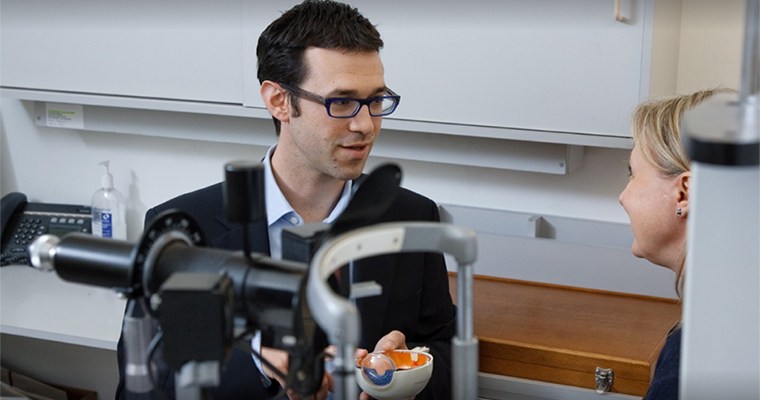A vision for early glaucoma diagnosis
12/03/2019

Beginning on Sunday March 10, World Glaucoma Week celebrates 11 years of raising awareness of the prevalence of glaucoma and the need for regular eye checks and research funds.
Cabrini glaucoma and cataract specialist Dr Simon Skalicky said glaucoma diseases were caused by eye pressure damaging the optic nerve and resulted in progressive vision loss.
“It is like a soccer ball that is pumped up too much. None of us can feel our eye pressure, so we don’t notice it.
Loss of sight happens gradually; we lose our peripheral vision first and then central vision.”
He said unfortunately people usually only notice a problem when their central vision has deteriorated and the glaucoma is quite advanced.
“There are around 300,000 Australians with glaucoma but only 50 per cent are diagnosed. Early detection is vital; we can’t reverse the damage already done but we can prevent it from getting worse.”
“In our busy world, it is easy to put off eye testing but if we can diagnose glaucoma early, we may be able to prevent vision loss later in life.”
Glaucoma is treated by lowering eye pressure to reduce the risk of progression of the disease. Laser treatment and drops may be used, with some patients requiring surgery if simpler measures fail to control the eye pressure.
“My advice is to get checked before the damage sets in.
Don’t wait for symptoms. Glaucoma Australia recommends people over 50 years of age should visit an optometrist annually. Those over 40 years should have their eyes checked every two years. Optometrists check for glaucoma as well as other preventable eye diseases. If a problem is picked up, people are then referred to an ophthalmologist.”
Dr Skalicky said glaucoma was the most common cause of irreversible blindness globally and was particularly prevalent in older people and those with a family history.
“If you have glaucoma, it’s important to encourage other family members to get checked. If your mother, father or grandparent has the condition then there is a chance you might have it too,” he said.
Funds are needed for research, including developing new ways of detecting early glaucoma, and potential future treatments such as gene therapy. Some patients might also benefit from new treatment devices such as minimally invasive glaucoma stents that are available today.
“It is important to talk about glaucoma and to celebrate the work that has been done both here and internationally to improve diagnosis and treatment, as well as raising funds for research.”
Apart from visiting an optometrist regularly, Dr Skalicky’s advice for good eye health is to eat a balanced diet including fresh fruit, vegetables and fish and to avoid smoking. He recommended people wear sunglasses in bright light and hats and sunscreen to protect the skin of the face around the eyes.
Ask your GP or optometrist about getting a referral to one of our highly-skilled *Cabrini ophthalmologists*[/find-a-doctor/]